
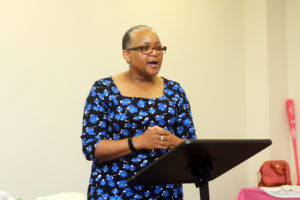
Photo caption: Reverend Dr. Beryl E. Dennis
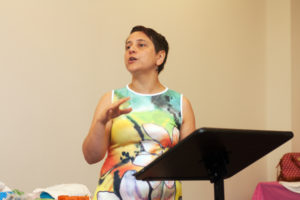
Photo caption: Mandi Pratt-Chapman
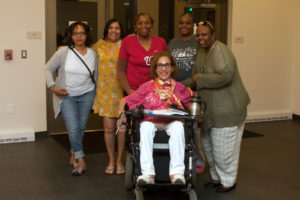
Photo caption: Left to right, standing: Jacque Perry, Sylvia Jackson, Thelma D. Jones, Angela Henderson, and Anthia Peters; Seated, center: Sheri Denksohn-Trott
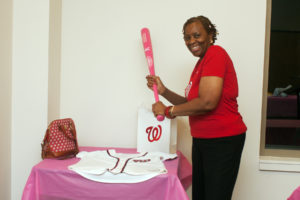
Photo caption: Thelma D. Jones showing off her Nationals apparel.
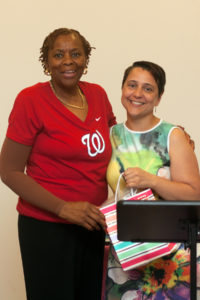
Photo caption: Thelma D. Jones presenting a gift to Mandi Pratt-Chapman.
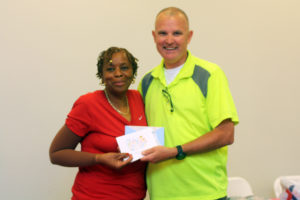
Photo caption: William “Bill” Kaemmer presenting a gift to Jones.
The Thelma D. Jones Breast Cancer Fund (TDJBCF) Support Group provides a place for patients, caregivers, and family members to learn about getting the much-needed support and latest information that can help them lessen the impact of their serious health challenges. A cancer diagnosis is always devastating news, but it no longer has to be considered a death sentence. Modern medicine and follow-up care have made great strides. This is not to say that things won’t still be difficult and at times emotional. This is the case not only for the patients, but for the family members who are caring for them as well. The support group is available for everyone. Meetings are held on the third Wednesday of every month at 6:30 p.m. at St. Augustine’s Episcopal Church, unless otherwise specified.
In her opening remarks, TDJBCF Founder Thelma D. Jones welcomed the group and introduced St. Augustine’s vestry member and finance chairperson, William “Bill” Kaemmer, who made a surprise $300 donation to the TDJBCF in support of its operating expenses. “Thanks to Thelma, who encouraged me to visit this church, I am enjoying being a member and wanted to support the TDJBCF as it’s a great outreach effort for the church, the community, and the region at large, as practically everyone knows someone with breast cancer or some other form of cancer,” Kaemmer said. Acknowledging the generous donation, Jones invited Kaemmer to share his recent medical challenge involving open heart surgery for a recently diagnosed genetic heart condition. Kaemmer not only shared his story but also committed to some fundraising efforts for the TDJBCF, including a future breast cancer walk and a proposed event on the Odyssey which drew a strong applause from the group. “I was surprised to learn I had an issue since I am an avid runner and had no symptoms. Yet, it was during a routine physical test at the military hospital at Fort Belvoir that caught the condition,” Kaemmer said. Kaemmer is currently on active duty orders and serves as the master of religious affairs NCO for the National Guard Bureau.
With a tough act to follow, Reverend Dr. Beryl Evangeline Dennis of the Wesley Theological Seminary presented her project thesis, “Caring for the Spirit of the Family Caregiver,” for her doctorate degree. The objective of this research project was to inquire about the lives and experiences of family caregivers, so a devotional could be developed that would speak directly to their needs as a way of caring for their spirits. Exploring “what caregivers need” opened the research to the very core of caring for the spirit of the family caregiver, because needs based on real experiences were identified. Volunteers are still welcome to participate in the research survey, which can be found here: https://www.esurveycreator.com/s/bdennisdminsurvey.
Dennis indicated that one of the most common responses to deal with caregiver stress is prayer. She suggested it is important for caregivers to rest, have some time for themselves, and not to feel guilty for doing so. Dennis’s objective is to educate people in faith communities and support groups about the importance of self-care, finding ways to relieve stress, and having someone who can step in to give them a break, allowing them to step away when things become overwhelming.
The group then heard from Mandi Pratt-Chapman, associate director of patient-centered initiatives and health equity at The George Washington University Cancer Center, who spoke about her work in patient navigation and improving health care for lesbian, gay, bisexual, transgender, questioning, and intersex (LGBTQI) patients. DC has one of the highest LGBTQI populations in the country. There is a need to address significant obstacles to care and health disparities in this population. For example, because of the biases experienced by the LGBTQI community, transgender men are 37% less likely to have cervical cancer screenings. Some of the problems that LGBTQI patients face include family rejection, provider bias and negative experiences in the health care system, and alcohol- and tobacco-related addiction as a result of chronic stress and targeted marketing. Also, there is very little research to guide the clinical care of intersex patients. Programs are being developed to address health care equity, and to assist providers in practicing better patient-centered care.
Health equity is also a problem for disabled people also, especially for women when it comes to getting mammograms and pap smears. Many disabled women have never had mammograms or pap smears because of the difficulties they face with both provider sensitivity and equipment that is designed for able-bodied patients.
After the Q&A session, Jones reminded the audience about the DC Department of Health Chronic Disease Self-Management Program (CDSMP) and the Cancer Thriving and Survivor (CTS) workshops, both of which she is trained and experienced in teaching. The CDSMP and CTS workshops are offered to District residents during 2.5-hour-long sessions held weekly for six weeks. The workshops are free to participants and led by two peer leaders, one of whom will have a chronic disease or be a cancer survivor. Each participant receives a guidebook entitled Living a Healthy Life with Chronic Conditions and a relaxation CD. Participants are empowered to manage their chronic conditions using brainstorming, action planning, and problem solving. For more information on the self-management program, please call (202) 442-5925, email dccancer.chronic@dc.gov, or visit http://doh.dc.gov.
During the door prize drawings, Jones directed the group’s attention to the display table, which included select gifts she received from the Washington Nationals as the 2018 Major League Baseball Bat Girl. This included, among other sponsor apparel, a Dooney & Bourke bag, a pink Nationals baseball cap autographed by Outfielder Andrew Stevenson (#45), tickets awarded to her and her guests to see the Nationals host the Los Angeles Dodgers on May 20, and a commemorative jersey with her name engraved on it, which she proudly sported on the field in a pre-game recognition that same day.
Co-sponsored by Black Benefactors (BB), a giving circle, the next support group meeting will be held on August 15 at 6 p.m. at St. Augustine’s. In observance of Black Philanthropy Month in August, TDJBCF support group members and the public will be invited to share why they give to make the world a better place. Giving stories, which should be 100 words or less, will be shared on BB’s website. For information on the TDJBCF, please visit us on Facebook at www.facebook.com/TDJBreastCancerFund/, email thelma@tdjbreastcancerfund.org, or call (202) 251-1639.
By: Elisabeth Ann Brown

